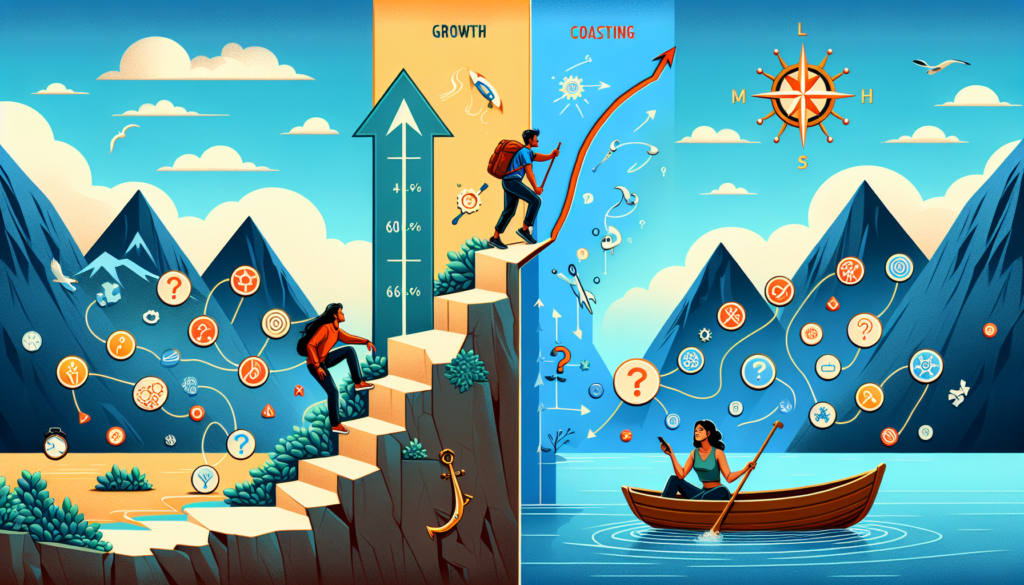Mid-Course Skills Check: Are You Growing or Coasting? A 2024 Self-Assessment Guide
Meta: Discover if you’re truly progressing or just going through the motions with our comprehensive mid-course skills assessment guide. Transform your learning journey today!
Did you know that 70% of professionals feel they’re not reaching their full potential in their learning journey? I’ve been there too! Whether you’re pursuing a certification, degree, or personal development goal, there comes a crucial moment when you need to honestly assess your progress. Let’s dive into a transformative self-assessment that will help you determine if you’re actively growing or simply coasting through your educational journey!

Understanding the Growth vs. Coasting Mindset
Let’s talk about the difference between pushing yourself to grow and just coasting along in your studies. You know those students who always seem eager to learn more? They’re the ones with a growth mindset. They’re curious, they ask questions, and they’re not afraid to make mistakes because they see them as learning opportunities.
On the flip side, we’ve all had moments where we’re just going through the motions, right? That’s what we call coasting. It’s when you’re doing the bare minimum to get by, not really challenging yourself or seeking out new knowledge.
There’s actually some interesting psychology behind why we hit plateaus in our learning. Sometimes it’s fear of failure, other times it’s just comfort with where we are. But here’s the kicker: your mindset has a huge impact on how much you actually learn and retain.
Key Indicators of Academic Progress
So how do you know if you’re actually making progress? Well, there are a few key things to look out for. First, you should be able to see measurable improvements in your skills. Maybe you’re writing better essays or solving math problems faster.
Another big indicator is being able to apply what you’re learning to real-world situations. It’s one thing to memorize facts, but can you use that knowledge to solve problems outside the classroom?
Pay attention to how you handle feedback, too. Are you taking constructive criticism and using it to improve? That’s a great sign of progress.
And don’t forget about your portfolio! Whether it’s a physical folder or a digital collection, seeing your work improve over time is a concrete way to track your growth.
Warning Signs You’re in Cruise Control
Now, let’s chat about some red flags that might indicate you’re coasting. Are you finding yourself less and less interested in your course material? That’s a big one. Or maybe you’re putting in minimal effort on assignments, just doing enough to get by.
If you’re not curious about the deeper concepts behind what you’re learning, that’s another sign. And if you find yourself actively avoiding challenging tasks, well, that’s pretty much the definition of cruise control.
Self-Assessment Tools and Techniques
Alright, so how do you figure out where you stand? There are lots of ways to track your progress. You might keep a learning journal or use an app to log your study hours and achievements.
Skill gap analysis is another useful tool. This is where you compare your current skills to where you want to be and identify what you need to learn to bridge that gap.
Don’t be afraid to compare yourself to your peers, either. Not in a competitive way, but as a benchmark to see where you might need to focus more effort.
And of course, there are always performance metrics like grades and test scores. They’re not everything, but they can be useful indicators of your progress.
Strategies to Accelerate Your Growth
Ready to kick things into high gear? Let’s talk strategy. First up, you might need to recalibrate your goals. Are they challenging enough? Too challenging? Just right?
Active learning is key. This means engaging with the material, not just passively reading or listening. Try teaching concepts to others or creating mind maps.
Finding an accountability partner can be a game-changer. This could be a study buddy or a mentor who can help keep you on track.
And don’t forget to optimize your resources. Are you using the best study materials? Taking advantage of office hours? Sometimes, accelerating growth is about working smarter, not just harder.
Taking Action: Your Growth Acceleration Plan
Alright, it’s time to put all this into action. Start by creating SMART learning objectives. That’s Specific, Measurable, Achievable, Relevant, and Time-bound goals.
Implement feedback loops in your study routine. This could mean regular check-ins with a teacher or self-assessments after each unit.
Build a support system. This could include study groups, tutors, or even online communities in your field of study.
Finally, establish clear milestones for your progress. These give you concrete targets to aim for and help you celebrate your achievements along the way.
Remember, the key to accelerating your growth is consistent effort and a willingness to push beyond your comfort zone. You’ve got this!

Conclusion
Wrap up with a call to action encouraging readers to implement their personalized growth plan and commit to regular self-assessment. Emphasize that awareness is the first step to transformation!




